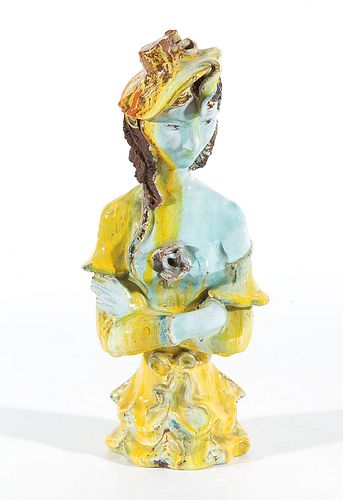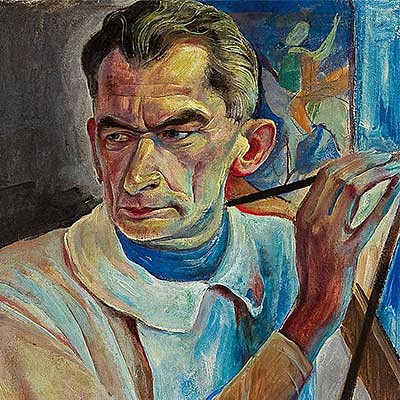SUSI SINGER* (Vienna 1891 - 1955 Los Angeles)
Lot 98
Categories
Estimate:
EUR€1,000 - EUR€1,500
$1,041.67 - $1,562.50
Absentee vs Live bid
Two ways to bid:
- Leave a max absentee bid and the platform will bid on your behalf up to your maximum bid during the live auction.
- Bid live during the auction and your bids will be submitted real-time to the auctioneer.
Bid Increments
| Price | Bid Increment |
|---|---|
| EUR€0 | EUR€10 |
| EUR€100 | EUR€50 |
| EUR€700 | EUR€100 |
| EUR€1,000 | EUR€200 |
| EUR€3,000 | EUR€300 |
| EUR€3,600 | EUR€400 |
| EUR€4,000 | EUR€500 |
| EUR€7,000 | EUR€1,000 |
| EUR€16,000 | EUR€2,000 |
| EUR€30,000 | EUR€3,000 |
| EUR€36,000 | EUR€4,000 |
| EUR€40,000 | EUR€5,000 |
| EUR€150,000 | EUR€10,000 |
About Auction
By Widder Auctions
Nov 28, 2022
Set Reminder
2022-11-28 10:00:00
2022-11-28 10:00:00
America/New_York
Bidsquare
Bidsquare : Viennese Art Nouveau, Expressionism, Modern Art
https://www.bidsquare.com/auctions/widder-auctions/viennese-art-nouveau-expressionism-modern-art-10414
Widder Auctions office@widderauktionen.com
Widder Auctions office@widderauktionen.com
- Lot Description
SUSI SINGER*
(Vienna 1891 - 1955 Los Angeles)
Elegant lady with rose, around 1925
red fired, glazed, height 27.5 cm
signed/scratched Werkstaette Susi Singer-Schinnerl., Gruenbach am Schneeberg. Majolica, polychrome, glazed. Engraved: SUSI SINGER.
artist of the Wiener Werkstaette
provenance: private collection Vienna
ESTIMATE #Euro 1.000 - 1.500
STARTING PRICE #Euro 1.000
Susi Singer studied from 1905 to 1915 at the Art School for Girls and Women with Tina Blau, Adolf Boehm and Otto Friedmann. Josef Hoffmann brought her to the Wiener Werkstaette in 1917. The latter entered with the ambition of creating artistic crafts of high quality in all areas of everyday use - from furniture and architecture to porcelain, glass and fashion - in close contact between artist and consumer. It is the interdisciplinary claim to holistic penetration of all areas of life, as well as their forward-looking designs, with which the Wiener Werkstaette has written lasting design history. Its founder, the architect Josef Hoffmann, joined forces with the graphic artist and painter Koloman Moser and the industrialist and patron Fritz Waerndorfer in 1903 with the aim of establishing a marketable aesthetic counterposition to encrusted historicism. The customers were mainly artists and the up-and-coming Jewish upper and middle classes. Josef Hoffmann's acquaintance with Berta Zuckerkandl led to the first major commission: the Purkersdorf Sanatorium west of Vienna, planned by Viktor Zuckerkandl, Berta's brother-in-law. Among the WW staff were about a dozen women who were crucial to the stylistic shift from Art Nouveau to Art Deco in the 1920s, such as Vally Wieselthier, Gudrun Baudisch, Reni Schaschl, Hilda Jesser, and Susi Singer. After joining the Wiener Werkstaette, Susi Singer first had to learn ceramic techniques, which is why Singer's first design was not accepted until 1919. She then rose to become one of the most productive and successful ceramists of the Wiener Werkstaette. Her focus was on figurative representation, either in a group ensemble, in combination with utility ceramics, or, from 1921, as an original individual figure. This expressively modeled "Elegant Lady with Rose" is one such figure. In 1925 Singer ventured into the large figure format: she presented a meter-high original ceramic at the "Exposition internationale des Arts Décoratifs et industriels modernes" in Paris. After her marriage to Josef Schinnerl, Susi Singer founded her own ceramics workshop in Gruenbach am Schneeberg in Lower Austria in 1925, which she ran until her emigration to the USA in 1937.
PLEASE NOTE:
The purchase price consists of the highest bid plus the buyer's premium, sales tax and, if applicable, the fee of artists resale rights. In the case of normal taxation (marked #), a premium of 24% is added to the highest bid. The mandatory sales tax of 13%, for photographys 20%, is added to the sum of the highest bid and the buyer's premium. The buyer's premium amounts to 28% in case of differential taxation. The sales tax is included in the differential taxation. - Shipping Info
-
We will send you the invoice shortly after the auction. As soon as we have recieved the amount, the art can be picked up at Johannesgasse 9-13, 1010 Vienna. Please note that the buyer is responsible for pick-up and shipping of the lot. Should you wish to ship your items, please contact: Mailboxes Email: oper@mbe-co.at Tel: 01 5128855 Please note that storage fees may apply, should the pieces not be picked up within 14 days after invoicing for domestic and 28 days for international transportation. Our team will be happy to assist you with any further information at office@widderauktionen.com or at 0043 676 555 66 10.
-
- Buyer's Premium



 EUR
EUR CAD
CAD AUD
AUD GBP
GBP MXN
MXN HKD
HKD CNY
CNY MYR
MYR SEK
SEK SGD
SGD CHF
CHF THB
THB












